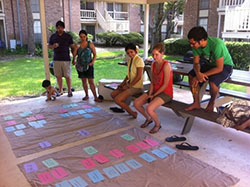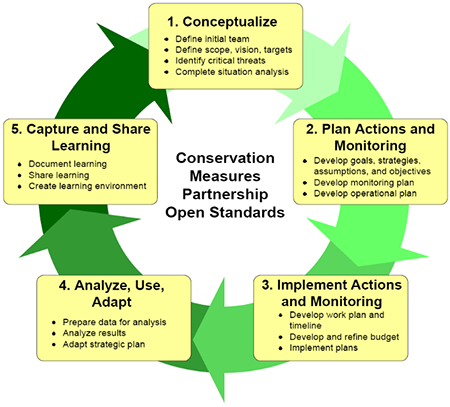WIS 6934 SYSTEMATIC PLANNING FOR BIODIVERSITY CONSERVATION PROJECTS
 Tools for effective evidence-based conservation, linking social and natural science to address conservation problems, and bridging the gap between research and conservation practice.
Tools for effective evidence-based conservation, linking social and natural science to address conservation problems, and bridging the gap between research and conservation practice.
Taught spring semester of most years.
Conservation practitioners and research scientists have limited resources (money, time, and people) to solve urgent and escalating conservation problems. To be effective with those resources, conservation practitioners need to carefully choose and prioritize their strategies, monitor whether they are being effective, and adapt strategies when they are not working. To make significant contributions to conservation, research scientists must identify and address critical information gaps for conservation, integrate social and natural science perspectives, and bridge the gap between science and practice. To obtain support from funders, partners, or stakeholders, practitioners and research scientists also need to be able to clearly communicate their goals and strategies, demonstrate their effectiveness, and rely on clear, transparent decision-making. The goal of the course is to provide students with training in a strategic and adaptive process for planning biodiversity conservation projects to meet these challenges and, also, to give students a common language and skill set increasingly required for jobs in the conservation arena.

This hands-on course is structured around the Open Standards For The Practice of Conservation developed by the Conservation Measures Partnership, a consortium of major conservation NGOs that joined together to design a common framework for increasing effectiveness of biodiversity conservation programs. Conservation organizations such as World Wildlife Fund, The Nature Conservancy, Wildlife Conservation Society, as well as US AID, US Fish and Wildlife Service, and Disney Conservation and others are using this evidence-based approach for design and measuring effectiveness of conservation programs across the globe. Increasingly, experience with the Open Standards and Miradi appears in the required skill set for staff positions with these organizations. Recent examples include, a Disney Conservation Program Manager Position for Freshwater and Marine Systems and a consultancy with World Wildlife Fund’s transboundary programs for Uganda and Rwanda.
In this class, student will learn by doing! Teams (3-4 students each) will develop a conservation plan for an area chosen by the team (see WIS 6934 Syllabus for steps), document the plan with Miradi, and conduct peer-review of other teams’ plans. Also, students will learn about resources such as the Conservation Coaches Network that can help support their future work in conservation.

After completing this course, students will be:
- Fluent in the language of conservation planning (and Miradi software) used by conservation organizations around the globe.
- Skilled in the steps for planning and implementing a conservation project, including developing a vision and goals, selecting biodiversity and human wellbeing targets, analyzing threats, identifying social, economic, and political factors that contribute to these threats, developing conceptual models of conservation problems, devising conservation strategies, and producing a theory of change and monitoring plan for these strategies.
At UF, graduate students have used these skills to develop conceptual models in their thesis research, prepare competitive grant proposals that link their research with conservation action, and educate local stakeholders regarding the importance of their field research. Beyond UF, former students are using their conservation planning skills to evaluate knowledge gaps for conservation in regions undergoing rapid change, engage local NGOs in strategic planning, and demonstrate the need for stronger integration of conservation and international development programs, among others.
READ THIS IF YOU ARE INTERESTED IN REGISTERING FOR THE COURSE
Registration is with permission of the instructors because class size is limited. If you are interested in taking the course, please download and fill out this questionnaire (Student Questionnaire Conservation Planning) and e-mail it to Lyn Branch at branchl@ufl.edu. This information will help us set up student teams for the class and be sure that students have appropriate background. All students in the class should have had experience with conservation issues in the field, either in a prior job or during graduate research, as this is an important context for planning. The course is oriented toward students who have extensive experience and interest in conservation of particular sites (e.g., a park, reserve, significant private lands, etc.), students who have previously worked or plan to work with NGOs or other organizations that design and implement conservation strategies, and also for graduate students interested in placing their research in a larger conservation context or planning a broader research program aimed at significantly impacting conservation problems.
